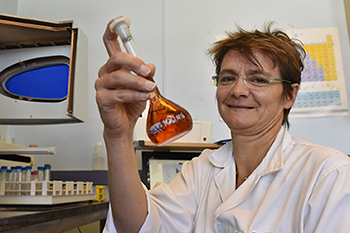Latest News Archive
Please select Category, Year, and then Month to display items
20 December 2020
|
Story Thabo Kessah
|
Photo Thabo Kessah
 Mbuyiselwa Moloi with student volunteers, Keamogetswe Mooketsi (presenter), Tshumelo Phaladi (producer), and Siphamandla Shabangu (SRC member – Social Justice and Universal Access).
Mbuyiselwa Moloi with student volunteers, Keamogetswe Mooketsi (presenter), Tshumelo Phaladi (producer), and Siphamandla Shabangu (SRC member – Social Justice and Universal Access).
The month of October 2020 marked the first anniversary of the Qwaqwa Campus online student radio, Q-Lit. “It has been a rocky road of sleepless nights, tears, and a lot of challenges. However, we have grown from strength to strength. We have made dreams of ordinary students possible. We have influenced change and inspired students to tap into their talents and potential,” said an elated station manager, Mbuyiselwa Moloi.
The station came in handy during the worst lockdown period of the COVID-19 pandemic when it bridged the communication gap between students and the university to integrate teaching and learning into the programming to ensure that no student was left behind. “With all of the regulations and online learning, Q-Lit had to be reinvented. While it was not an easy journey, we have grown more than ever before. Our August 2020 report shows that we have pulled in more than 1 600 listeners, even amid the learning, unlearning, and relearning processes. It was during this month that we also ran a series highlighting strategic offices led by women on campus as part of our Women’s Month celebration,” Mbuyiselwa revealed.
Looking to the future, the station hopes to obtain a full broadcasting licence from the regulatory body, the Independent Communication Authority of South Africa (ICASA), soon.
UFS Ground Studies Laboratory receives accreditation to international standard
2016-03-18

Lore-Mari Deysel, Deputy-Director of the institute for Groundwater Studies.
Photo: Charl Devenish |
The Institute for Groundwater Studies (IGS) Laboratory at the University of the Free State is on equal footing with international testing labs. With its accreditation in March 2016 by SANAS (South African National Accreditation System), the IGS Laboratory now officially meets global standards.
Quality of water
The IGS Laboratory mainly analyses the quality of water samples. When it was originally established in 1989, the lab’s central function was to conduct testing for researchers at the institute itself. “After the public and water boards realised their need to analyse water samples, the IGS Laboratory expanded to deliver a service to these clients,” says Lore-Mari Deysel, Deputy-Director of the institute.
Since suppliers and regulatory authorities will not accept test or calibration results from a lab that is not accredited, the IGS initiated the accreditation process.
Accreditation to international standard
In order to be deemed technically competent and able to receive accreditation, labs must meet the ISO/IEC 17025 standard. ISO/IEC 17025 was first issued in 1999 by the ISO (International Organization for Standardization) and the IEC (International Electrotechnical Commission).According to Deysel, this is the single most important standard for calibration and testing laboratories around the world.
“Laboratories that are accredited to this international standard have demonstrated that they are technically competent and able to produce precise and accurate test and/or calibration data. Furthermore, it demonstrates that the university has the capacity to supply valuable and reliable services alongside the academy,” Deysel says.